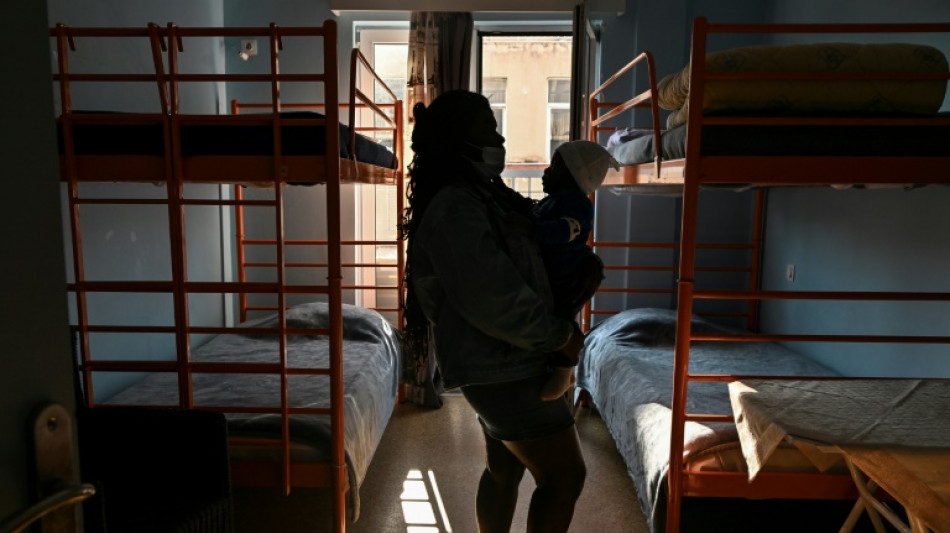

Abused refugee in Greece says 'no longer afraid to speak up'
For Congolese asylum-seeker Ruth, the fact her husband beat her was something she used to keep a tightly guarded secret.
Like so many abused women, the 23-year-old mother-of-three's suffering remained shrouded in silence.
"My husband was violent but I had been hiding it for a long time. Then one day, I couldn't lie, my face was scarred by the beatings," she said.
"A social worker helped me and found me a place in this centre", murmurs Ruth, who did not want to give her full name, still upset.
"Being a woman has often been synonymous with hardship for me, but today I am no longer afraid to speak up."
The intervention of the social worker resulted in Ruth finding shelter and help in Athens.
"The difficulties have not destroyed me. Today I am moving forward", the young mother of three sons aged five, three and nine months old tells AFP.
Holding her restless youngest child in one hand, she explains that she was "saved" two-and-a-half months ago after being transferred from the Elaionas migrant camp on the outskirts of Athens.
Now, she is trying to recover thanks to the "A Step Forward" programme, set up by the NGO Doctors of the World in collaboration with fund operator Sol Crowe and Human Rights 360, with European funds.
The programme operates a reception centre for vulnerable women asylum-seekers and their children providing housing, counselling, healthcare and education while they apply for asylum.
Since June 2021, it has welcomed more than 40 single women with children, mostly from the Democratic Republic of Congo, sub-Saharan Africa and Afghanistan.
"All the women who come here are victims of violence. Some have suffered rape, physical violence, others were oppressed by their families who prevented them, for example, from studying," notes Evi Papayianni, the social worker in charge of the centre.
- 'A sense of safety' -
"Our goal is to give them a sense of safety, strength and also to make them understand that they have rights.
"If for Greek women, filing a complaint is difficult, for foreign women this is even more so!" Papayianni adds.
Psychological help, seminars on violence against women and their rights, language courses, yoga, drawing... asylum-seekers can take advantage of a wide range of services as they wait to obtain their documents.
Then there is help to find a job or put them contact with other organisations which can help them.
In a just few months, Papayianni says, the women can see their lives transformed and regain their confidence.
"When I first met Ruth, she was very withdrawn and her children were scared, they didn't speak. Now they are smiling, they are getting back their hunger for life," she says.
For Ruth, "the most important thing is to talk, to free yourself from your past".
"I'm still disturbed, I had trouble concentrating but the psychologist and the sports sessions are helping me," she says.
After losing her parents in Congo, the young woman explains she "no longer had any protection".
"I lived on the street, I suffered sexual violence. Then I found my husband. He sold his house, we flew to Istanbul," she says, looking at her sons with a protective gaze.
- Vulnerable but brave -
From Turkey, the family then began the "dangerous journey".
"I thought we were never going to get to Lesbos. The dinghy was overloaded, two people fell overboard during the journey," she recalls.
On February 7, 2021, when they landed on the Greek island a few kilometres from the Turkish coast, the police were waiting for them and tried to get them to re-embark in order to send them back to Turkey, Ruth says.
Out of the 30 passengers, 18 managed to hide for 10 hours and get registered in the Mavrovouni camp, she adds.
NGOS accuse Greek border officers of illegal pushbacks of migrants. But Athens vehemently denies the claims, insisting its coastguard saves lives at sea.
"All that belongs to the past. Now I'm thinking about my future. I would like to go back to school and become a midwife," Ruth says.
And as Women's Day approaches, she wonders: "Are we more vulnerable? In a way yes, I've been through a lot because I'm a woman, but I've always had the courage to keep fighting."
Then, she pauses and adds: "No, we women, we are strong!"
H.Vaccarello--LDdC



